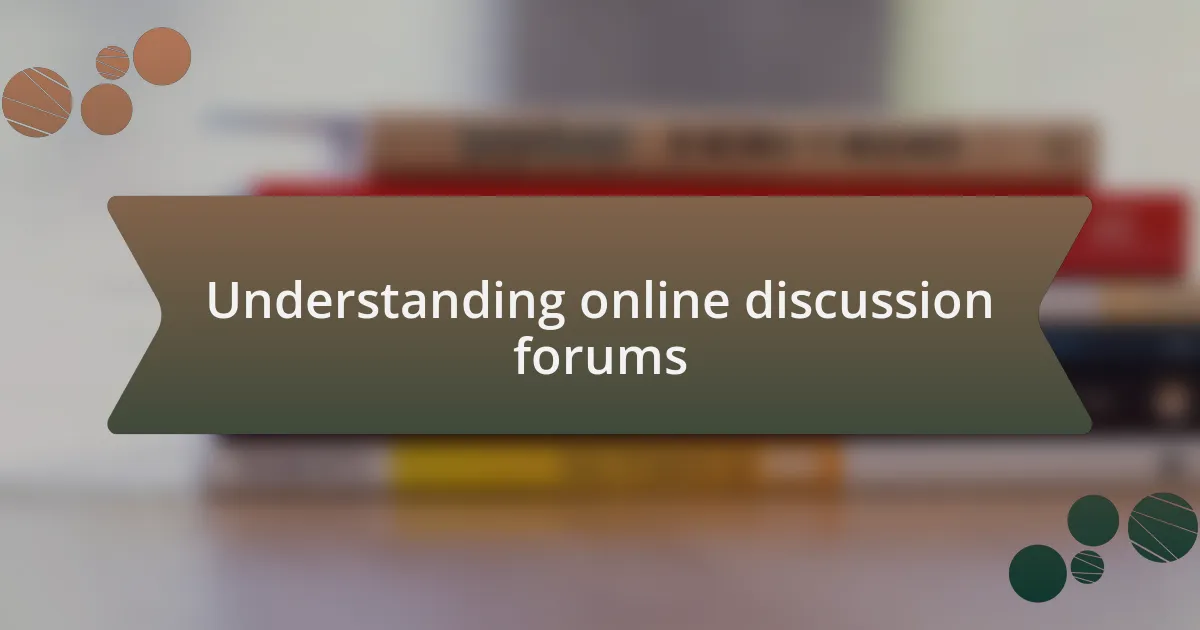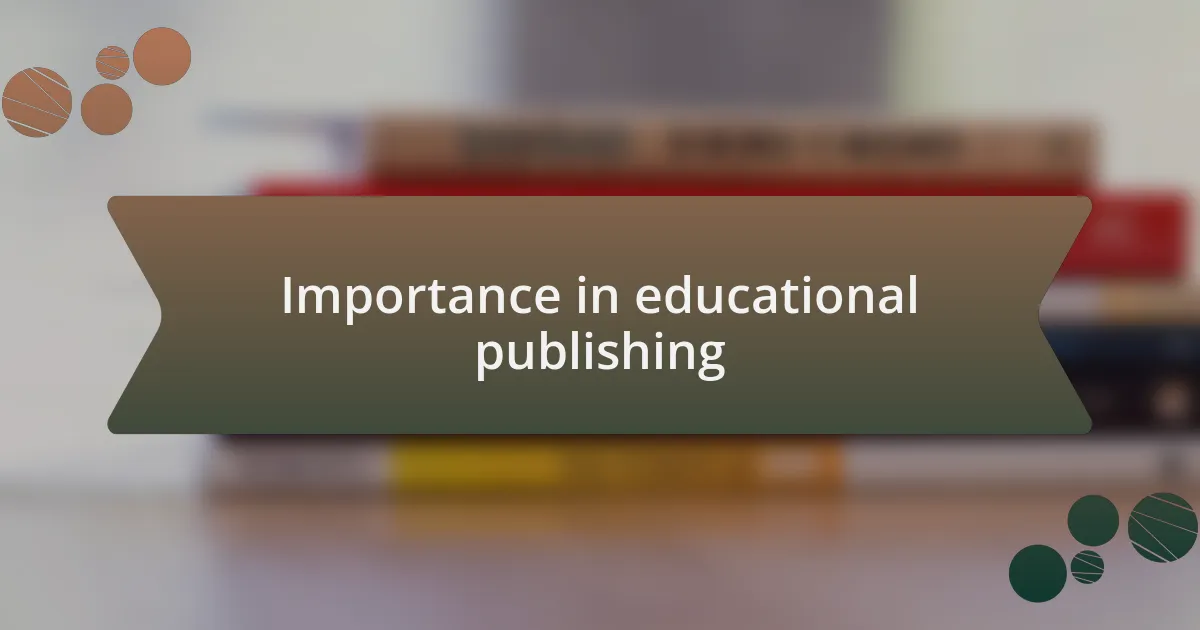Key takeaways:
- Online discussion forums foster vibrant dialogue and diverse perspectives, enriching understanding and learning.
- They play a crucial role in educational publishing by facilitating collaboration between educators and content creators.
- Active participation, open-ended questions, and acknowledgment of contributions enhance community engagement and knowledge exchange.
- Personal experiences in forums can lead to transformative insights and supportive networks among educators.

Understanding online discussion forums
Online discussion forums serve as vibrant platforms where individuals can engage in dialogue on a multitude of topics. From my experience, these forums often feel like a gathering place for shared interests and ideas. Have you ever found yourself scrolling through topics that ignite your passion? I certainly have, and it’s fascinating how a single thread can spark a treasure trove of insight.
The structure of these forums typically allows for both immediate responses and in-depth interactions over time. In my time participating in various forums, I’ve seen conversations evolve dramatically, revealing how different perspectives enrich the original topic. Isn’t it intriguing how a question posed by one person can lead to a cascade of answers that collectively deepen our understanding?
Additionally, the anonymity that online discussion forums provide can encourage honest and open conversations. I remember a time when I felt hesitant to voice my opinion in a public setting, but online, I could express my thoughts freely. I believe this safety can unlock valuable insights, but it also raises the question of how we maintain respect and civility in a space where anyone can join the discussion.

Importance in educational publishing
The role of online discussion forums in educational publishing can’t be overstated. I recall a time when I stumbled upon a forum dedicated to a specific teaching method. The shared experiences and resources from educators across the globe opened my eyes to practical applications I never considered before. Have you ever found a hidden gem of knowledge in a thread that transformed your approach? It’s those shared insights that can truly enhance educational materials.
Moreover, these forums facilitate collaboration between authors and educators, bridging the gap between content creators and users. I’ve participated in discussions where educators shared feedback on a textbook draft, providing perspectives that significantly refined the final product. Isn’t it amazing how direct input from the field can shape the way we publish educational resources?
Ultimately, the knowledge exchange that occurs in these forums fosters a community of continuous learning. I often find myself revisiting certain threads that resonate with my practice, soaking in new ideas. This connection not only enriches my understanding but also supports a culture of growth within educational publishing.

Benefits of engaging in forums
Engaging in online forums offers a wealth of insights that often surpasses traditional learning methods. I remember the excitement I felt after participating in a lively debate about digital teaching tools. The varied perspectives challenged my assumptions and encouraged me to rethink my approach. Have you ever experienced that lightbulb moment where someone else’s idea clicks with your own?
Another significant benefit is the sense of community that these forums foster. I’ve connected with professionals who share the same passion for educational innovation. This network has become a vital support system, providing encouragement and resources when I encounter challenges in my work. Isn’t it comforting to know there are others out there navigating similar paths?
Lastly, engaging in discussions often leads to unexpected opportunities for professional growth. One time, a colleague I met through a forum invited me to co-author an article on an emerging educational trend. This collaboration not only expanded my reach but also deepened my understanding of the topic. How often do chances like this arise from casual online interactions? It’s amazing to think about the connections we can forge simply by sharing our thoughts.

Popular educational discussion platforms
When discussing popular educational discussion platforms, I can’t help but mention Reddit’s education communities. They offer a treasure trove of knowledge shared through diverse threads. I vividly recall a time when I stumbled upon a sub-thread focused on innovative assessment techniques. The eager exchanges among educators tackling the same issues made me feel part of something larger—like a virtual roundtable filled with passionate professionals.
Another platform that stands out is LinkedIn Groups. They serve as a professional space where educators can share insights and seek advice. I once joined a group dedicated to online teaching strategies and found myself engaged in a conversation that sparked a new project idea. Isn’t it fascinating how exploring different viewpoints can ignite creativity? It’s a great reminder that the more we interact, the more energized we become.
Moreover, platforms like Edutopia foster rich discussions tailored specifically to educational practitioners. I remember contributing to a thread about integrating technology in the classroom and feeling an immediate sense of camaraderie. The validation from peers validating my thoughts was uplifting. Doesn’t it feel good to be surrounded by like-minded individuals who understand the educational landscape? It’s in these discussions that I often find my own perspectives enriched beyond what I initially believed.

How to participate effectively
To participate effectively in online discussion forums, it’s crucial to engage actively rather than just lurking. I remember joining a thread about differentiated instruction, where I hesitated to share my thoughts at first. But once I did, the response was overwhelmingly positive, showing me that our contributions can significantly impact others’ teaching practices. Why not take that leap and share your insights?
Another effective method is to ask open-ended questions that encourage deeper conversations. When I sought opinions on incorporating gamification in my lesson plans, the diverse responses not only provided valuable ideas but also led me to rethink my strategies. Isn’t it interesting how one question can open up a floodgate of knowledge and collaboration?
Lastly, I find that acknowledging others’ contributions fosters a supportive atmosphere. During a discussion about classroom management techniques, I made sure to highlight a particularly helpful suggestion someone made. That small act of recognition not only strengthened our connection but also inspired others to share more openly. How often do you think appreciation can turn a casual exchange into a meaningful dialogue?

Personal experiences with forums
When I first ventured into online discussion forums, I remember being both excited and a bit nervous. My initial experience was with a community focused on special education strategies. I posted a question about behavior management techniques and was taken aback by the flood of responses, each offering different perspectives and approaches. It made me realize how valuable these platforms are for gaining insights that we, as educators, might not encounter in our day-to-day work.
There’s something uniquely rewarding about connecting with educators from various backgrounds. I participated in a thread about integrating technology in the classroom, and a fellow educator shared a lesson plan that completely transformed my approach. The thrill of trying something new, sparked by another’s experience, reminded me how forums can be a treasure trove of innovative ideas. Have you ever felt that spark of inspiration from a fellow teacher?
My experiences with forums have also taught me the importance of building rapport. I once returned to a discussion on literacy interventions to find someone had followed up on my previous post. This engagement created a sense of community, making me more willing to share my experiences and challenges. Isn’t it fascinating how online interactions can lead to real relationships, turning virtual conversations into a supportive network?

Tips for maximizing forum engagement
Creating a vibrant and engaging atmosphere in online forums starts with participation. I’ve found that being active—whether by sharing questions, insights, or resources—sparks more interaction. I once shared a video of a classroom activity I tried, and the responses flowed in like a lively discussion at a staff meeting. Have you seen how energy builds when you toss a new idea into the mix?
Another tip I’ve learned is to respond thoughtfully to others’ contributions. I remember a time when someone shared their struggles with classroom dynamics, and I took the time to reflect on their situation and offer targeted advice based on my own experiences. That personal touch not only deepened the conversation but also encouraged them to share more, reinforcing our connection. Isn’t it rewarding to know that your input can motivate someone else to keep participating?
Lastly, consider the power of gratitude in fostering engagement. A simple “thank you” can go a long way. Once, I acknowledged someone’s detailed feedback on a post about curriculum changes, and it turned into an ongoing dialogue. It’s little gestures like this that build a welcoming environment, making others feel valued and more likely to join the conversation. Have you tried expressing appreciation in your discussions? It might just inspire a surge of shared knowledge and camaraderie.